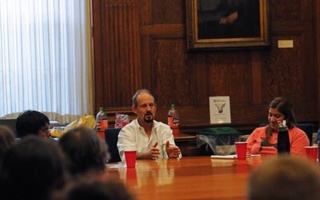Arguing that government has a responsibility to impose and solidify virtue in its citizens, conservative columnist George F. Will last night criticized modern politicians' reluctance to assert social values for the common good.
"If government is to be more responsive to social forces, it must be concerned with creating public-spiritedness because history has shown that individuals do not willingly adhere to 'self-evident truths,'" Will told a capacity crowd of 350 at the Kennedy School in the second of three talks delivered for the 1981 Godkin Lectures.
Voicing the theme of his speeches, which will be published as a book entitled "Statecraft and Soulcraft: What Governments Do", the Pulitzer-prize winning contributing editor of Newsweek said, "Government has to be engaged in legislating morality."
The Best
Will called the Civil Rights Acts of 1964 and 1965 the "most admirable achievement of modern liberalism in that it explicitly and successfully molded beliefs by compelling the community to change their values in order to bring about improvement in the lives of all people."
Will, whom James Q. Wilson, Shattuck Professor of Government, introduced as a "truly authentic conservative steeped in the classical essence of political life," added that laws should be crafted to foster a community in which people can rule themselves.
Distinguishing between a "good man and a good citizen", Will argued that as "morality shapes our laws, laws should shape our morality," and emphasized the tie between the "ethics and power" of the government.
"The Moral Majority and similar conscious-raising groups are not to be blamed for bringing such moral issues to the forefront of political affairs," he added.
Earlier in the day, Will told an overcrowded meeting of Moral Reasoning 22 ("Justice") that he favored the reinstitution of the draft.
Read more in News
STUDENT ACTIVISM:Recommended Articles
-
Questioning HomosexualityA recent issue of the magazine Flare entitled its cover story "Moving Beyond the Morality Debate." Unfortunately, the series of
-
LettersMorality Debate Won't Lead to Consensus To the editors: In "Questioning Homosexuality" (Opinion, March 13), Stephen E. Sachs '02 claims
-
German 'Collective Guilt' a Fallacy, Arendt States at Ford Hall ForumHannah Arendt attempted yesterday to clear away the confusion surrounding the moral dilemma which faced citizens of Nazi Germany. The
-
 Prof Discusses Morality’s Genetic Roots
Prof Discusses Morality’s Genetic Roots -
 Of Morals And Magnets
Of Morals And Magnets -
Panelists Talk Science, EthicsMixing DNA and Descartes, the panel discussed how developments in evolutionary biology and the mind sciences should be applied to law, philosophy, and economics.













